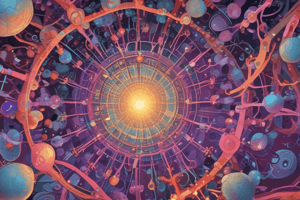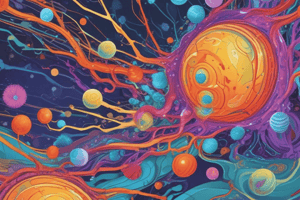Podcast
Questions and Answers
What is the function of antibodies that involves marking pathogens for destruction by immune cells?
What is the function of antibodies that involves marking pathogens for destruction by immune cells?
- Complement activation
- Antibody-dependent cellular cytotoxicity (ADCC)
- Neutralization
- Opsonization (correct)
Which function of antibodies involves preventing pathogens from attaching to host cells or infecting other cells?
Which function of antibodies involves preventing pathogens from attaching to host cells or infecting other cells?
- Opsonization
- Antibody-dependent cellular cytotoxicity (ADCC)
- Neutralization (correct)
- Complement activation
What function of antibodies involves activating the complement system to destroy pathogens?
What function of antibodies involves activating the complement system to destroy pathogens?
- Complement activation (correct)
- Opsonization
- Neutralization
- Antibody-dependent cellular cytotoxicity (ADCC)
Which function of antibodies involves activating immune cells like natural killer (NK) cells to destroy pathogens?
Which function of antibodies involves activating immune cells like natural killer (NK) cells to destroy pathogens?
Among the given functions, which one describes the process where antibodies bind to pathogens and prevent them from infecting cells?
Among the given functions, which one describes the process where antibodies bind to pathogens and prevent them from infecting cells?
Which antibody function involves binding to pathogens and marking them for destruction by phagocytes?
Which antibody function involves binding to pathogens and marking them for destruction by phagocytes?
What is the primary function of IgM antibodies?
What is the primary function of IgM antibodies?
Which antibody class provides longer-lasting protection by neutralizing pathogens?
Which antibody class provides longer-lasting protection by neutralizing pathogens?
What is the mechanism of action of antibodies in antibody-dependent cellular phagocytosis?
What is the mechanism of action of antibodies in antibody-dependent cellular phagocytosis?
Which region of antibodies contains unique structures that enable them to bind to specific antigens?
Which region of antibodies contains unique structures that enable them to bind to specific antigens?
In which therapeutic application are ready-made antibodies introduced for immediate protection against specific pathogens?
In which therapeutic application are ready-made antibodies introduced for immediate protection against specific pathogens?
Which antibody class is involved in the neutralization of pathogens and the activation of complement?
Which antibody class is involved in the neutralization of pathogens and the activation of complement?
Flashcards are hidden until you start studying
Study Notes
Antibodies: Nature's Defensive Shield
Antibodies, also known as immunoglobulins, are complex proteins produced by our immune system. They play a vital role in defending our bodies from invading pathogens. In this article, we'll explore antibodies' functions and how they contribute to our immune system's diverse capabilities.
Structure
Antibodies are Y-shaped molecules, each composed of four polypeptide chains: two identical light chains and two identical heavy chains. Each chain contains unique regions that enable antibodies to bind to specific antigens, which are foreign substances like bacteria, viruses, or toxins.
Functions
Antibodies perform several important functions that help combat pathogens and maintain our overall health:
-
Neutralization: Antibodies can bind to pathogens, neutralizing them and preventing them from attaching to host cells or infecting other cells.
-
Opsonization: Antibodies can bind to pathogens and mark them for destruction by immune cells, including phagocytes, which engulf and destroy the pathogens.
-
Complement activation: Antibodies can activate the complement system, a group of proteins that help destroy pathogens by forming pores in their membranes, leading to their destruction.
-
Antibody-dependent cellular cytotoxicity (ADCC): Antibodies can bind to pathogens and activate immune cells, such as natural killer (NK) cells, to destroy the pathogens.
-
Antibody-dependent cellular phagocytosis (ADCP): Antibodies can bind to pathogens and activate immune cells, such as macrophages and neutrophils, to engulf and destroy the pathogens.
Variability
Antibodies are highly variable molecules that can recognize millions of unique antigens. Their variability arises from two regions in the antibody's heavy chains: variable (V) regions and constant (C) regions.
- Variable regions: The V regions contain the unique structures that enable antibodies to bind to specific antigens.
- Constant regions: The C regions determine the antibody's function and how it interacts with other immune system components.
Classes and Types
Antibodies are classified into five classes, also known as isotypes: IgA, IgD, IgE, IgG, and IgM. Each class has distinct functions and properties. For example, IgM antibodies are the first to appear after an infection, acting as a bridge to recruit other immune cells, while IgG antibodies provide longer-lasting protection by neutralizing pathogens and activating complement.
Therapeutic Applications
Antibodies play an important role in various medical treatments, such as:
- Replacement therapy: Replacing antibodies that are deficient or absent due to genetic disorders.
- Passive immunization: Introducing ready-made antibodies to provide immediate protection against specific pathogens.
- Monoclonal antibodies: Producing antibodies that target specific antigens, such as cancer cells or misfolded proteins, to treat a variety of diseases.
In conclusion, antibodies are essential components of our immune system, providing a diverse arsenal of weapons to combat foreign substances and maintain our health. They are highly variable molecules that can recognize millions of unique antigens, and their functions extend from neutralization and opsonization to complement activation and antibody-dependent cellular cytotoxicity. Antibodies are involved in various therapeutic applications, such as replacement therapy, passive immunization, and monoclonal antibodies. Understanding antibodies' structure, functions, and applications can provide valuable insights into the intricate mechanisms of the immune system and promote the development of new treatments for various diseases.
Studying That Suits You
Use AI to generate personalized quizzes and flashcards to suit your learning preferences.



